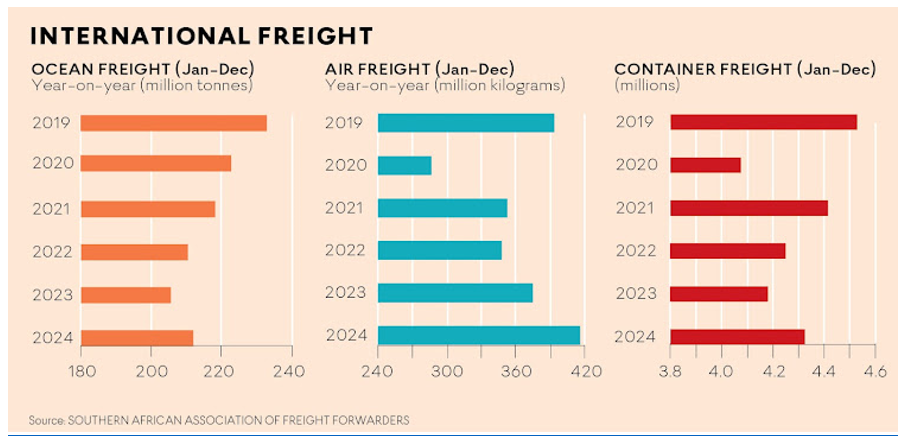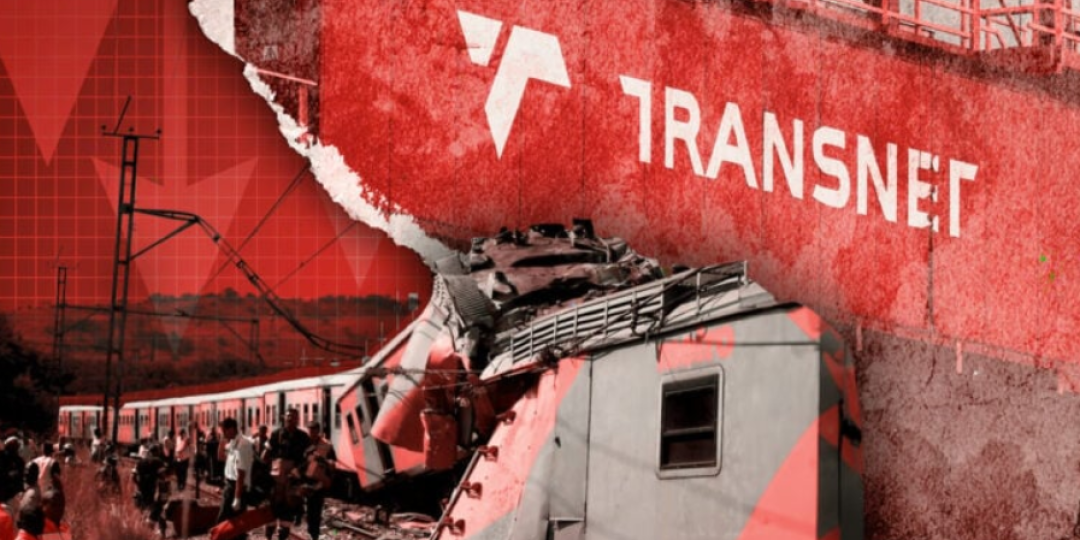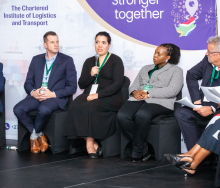As finance minister Enoch Godongwana was preparing to deliver South Africa’s ‘Budget 2025’, with some freight industry analysts saying they’re not expecting fireworks about Transnet’s diabolical finances, it has emerged that the country is losing R1 billion each day in missed trade opportunities.
Business Day has reported that Dr Juanita Maree, CEO of the South African Association of Freight Forwarders, said port delays, rail disruptions and related infrastructure bottlenecks had collectively contributed to daily losses.
She explained that, with the country’s total daily trade exceeding R4 billion, the inability to manage cargo flows efficiently had led to cargo diversions and increased operational costs for businesses, ultimately reducing potential export volumes.
Maree said although trade as a percentage of GDP had risen during the logistics crisis, this should not be mistaken as an indication that logistical inefficiencies were insignificant. Instead, she emphasised that the country had forfeited greater trade expansion opportunities due to these persistent challenges.
In 2023, South Africa recorded a combined import and export trade volume of R4.02 trillion. This figure declined by 3.9% to R3.87 trillion in 2024, despite a positive trade balance increase of R190 billion.
World Bank data shows merchandise trade as a percentage of GDP climbed from approximately 50% between 2017 and 2019 to around 63% in recent figures, but experts argue that this rise does not imply an absence of negative consequences for trade.
Maree pointed out that every economic sector was affected by inadequate logistics capacity. Supply chain disruptions, she said, had a cascading impact, resulting in losses at production, manufacturing, wholesale, retail, and transportation levels, ultimately undermining South Africa's global market position.
South Africa's logistics system, responsible for the efficient movement of goods via ports, railways, and road networks, has experienced systemic decline since around 2018. Congestion at major ports like Durban and Cape Town, frequent interruptions along Transnet's rail corridors, and deteriorating road conditions have worsened the crisis. Businesses now face higher costs, lengthier transit times, and the need to reroute cargo to ports in neighbouring countries.
Annabel Bishop, Investec's chief economist, referenced a Fitch BMI report that highlights South Africa's declining competitiveness as an emerging market logistics hub, attributing this to internal supply chain disruptions, worsening infrastructure, and increased criminal activity along trade routes.
Maree warned that ongoing logistical constraints could jeopardise South Africa's role as a regional trade hub. She cautioned that, without urgent reforms, there was a significant risk of cargo being permanently rerouted to ports such as Maputo and Walvis Bay, which would further erode the country's economic prospects.
The National Treasury, under pressure to maintain fiscal discipline, has demanded measurable progress from state-owned enterprises before offering financial assistance. This has intensified pressure on Transnet, which faces a R50 billion infrastructure backlog and debt projected to reach R151 billion by 2025, following years of mismanagement and corruption.
Hugo Pienaar, chief economist at the Minerals Council South Africa, explained that bulk commodities like coal, iron ore, manganese, and chrome were particularly impacted. He noted that, due to Transnet's rail service constraints, producers had increasingly resorted to road transport, which was costlier, less environmentally friendly, and harmful to infrastructure. For commodities like iron ore, he said, trucking was unviable, resulting in reduced exports and production slowdowns as stockpiles accumulated.
Business Day journalist Jana Marx added that the citrus industry, especially reliant on the Cape Town port, had also been affected.
Paul Hardman, COO of the Citrus Growers' Association, highlighted concerns about container terminal efficiency and equipment breakdowns. While 2024 experienced fewer bottlenecks, Hardman attributed this to lower-than-expected exports due to extreme weather and high local juicing prices. He projected that rising citrus production would strain ports further in coming years and urged infrastructure improvements. Hardman suggested that coordinated efforts could boost annual citrus exports from 165 million to 260 million cartons within seven years, potentially creating 100 000 new jobs and generating substantial revenue.
Despite the private sector reducing capital investment in transport equipment during the first three quarters of 2024, improvements in Transnet's rail capacity and reduced port congestion were noted. Bishop reported that average port congestion in South Africa was approximately four days, shorter than the UK and France (eight days), the US and India (six days), China (5.5 days), and comparable to Mexico and Spain.
Dr Jacob van Rensburg, Saaff's Head of Research & Development, observed early signs of rail network recovery due to targeted interventions and private-sector collaboration. Freight volumes across bulk ocean freight, containers, and air freight rose by 3%, 4%, and 11% respectively in 2024 compared with the previous year.
In his State Of the Nation Address, President Cyril Ramaphosa said the government had issued a network statement in December to allow private operators access to the freight rail system, while keeping the infrastructure state-owned. He added that new port equipment, including cranes, was being commissioned to expedite cargo handling and reduce ship waiting times. Ramaphosa highlighted that the Freight Logistics Roadmap (FLR) aimed to revitalise port terminals and rail corridors with private capital investments.
Maree, however, criticised the FLR’s progress, describing it as slow and underperforming relative to its design capacity and global standards.














